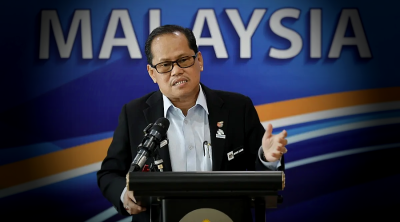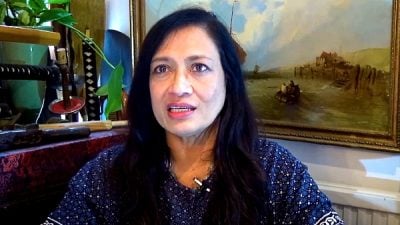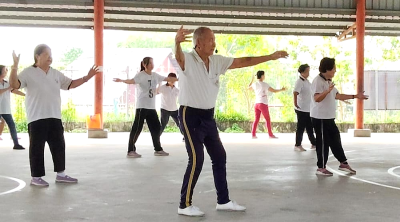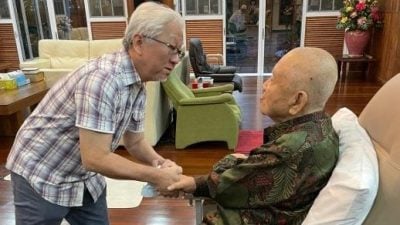
Syamsul Haris Shamsudin was a cadet at Universiti Teknologi Malaysia, and at the end of July, his mother Ummu Haiman Bee Daulatgun was notified that he had died during a training exercise.
Ummu Haiman was suspicious about how her son met his death, which his superiors said had happened during training. It was alleged that he had suffered a seizure,
Dissatisfied with their claims, she unsuccessfully tried to obtain the results of the autopsy report.
Undaunted, she sought a court order to have her son’s body exhumed and a second post-mortem done.
Then on November 4, following the completed autopsy, she was faced with a few more dilemmas.
■ Both hospitals refused to release the report.
■ They cited an ongoing police probe despite her compliance with all payment and document requirements.
■ She also alleges that one medical officer involved in the first autopsy was “unauthorized” due to an expired credentialing certificate.
Frustrated with the stalled progress and the lack of cooperation from the various officials, she filed a lawsuit against the Minister of Health, two hospital directors, and several medical personnel.
Months earlier, the Ministry of Defense claimed that investigations by a joint committee had found no evidence of abuse in the cadet’s death.
Despite this, the family were puzzled to find that they had been refused the autopsy report and worse was to follow.
After the second post-mortem had been conducted, that autopsy report too had also been withheld.
Many wonder why Malaysians should not get involved in what some may claim is a personal matter, but if they were to analyze the predicament faced by Ummu Haiman, this case isn’t just about one family.
The whole scandal raises bigger questions about institutional accountability, about public trust and about the citizens’ right to information.
Why should families like Ummu Haiman’s, have to fight just to get basic answers about her son’s suspicious death? Why should both reports be delayed, and withheld from the family? How does this affect public trust in healthcare and public institutions?
Those who have been involved in inquests will appreciate that delayed autopsy reports aren’t just frustrating.
They can prevent families from getting closure. They also obstruct justice, and they can hide systemic mistakes.
In the cadet’s death, multiple parties were allegedly involved.
This includes the ministry, hospitals, and officials. Without proper enforcement and adherence to the rules, accountability can get unnecessarily complicated.
Whilst Ummu looks for answers about her son’s death, citizens too have found that the case has also given rise to many difficult questions:
Can we trust institutions to be transparent? How do we protect our rights? What if we had to face similar situations?
Those whose loved ones have experienced mysterious deaths understand the many complications that could crop-up.
The innumerable delays and the lack of transparency in healthcare or government processes present more obstacles.
For Ummu, whose fight is to get justice for her son, knows that this isn’t just one lawsuit, because it reflects broader systemic issues.
Public institutions that the public have come to depend on, have failed to provide timely answers thus laying the foundations for erosion in public trust.
Ummu’s case has the potential to provide many lessons that could improve healthcare or prevent future similar tragedies during the cadets’ training exercise.
However, many basic answers have not been forthcoming.
Families without resources or knowledge may never get answers, leaving them powerless.
Transparency isn’t just a family issue, because it is also a societal issue.
Malaysians may wonder what responsibilities do we, as citizens have, to demand accountability and transparency?
Perhaps we should remember the following basics:
1. Know our rights: Families can request post-mortem and investigation results.
2. Delays can be systemic: Ask questions and escalate the problem if necessary.
3. Public awareness matters: Media, advocacy, and citizen engagement hold institutions accountable. Society would have a different outlook, if every family were to demand transparency because institutions will have been forced to respond differently.
The UTM cadet case reminds us that transparency is essential, and that it cannot be treated as optional.
If as the Ministry of Defense claims, that earlier investigations had found no evidence of abuse, then why are they withholding the autopsy report?
For as long as Ummu Haiman fights to get justice for her son, Malaysians should also rally behind her so she can get the closure that has been denied her family all these months.
It is now not just a family issue, but has morphed into one that affects society.

(Mariam Mokhtar is a Freelance Writer.)
ADVERTISEMENT
ADVERTISEMENT








































